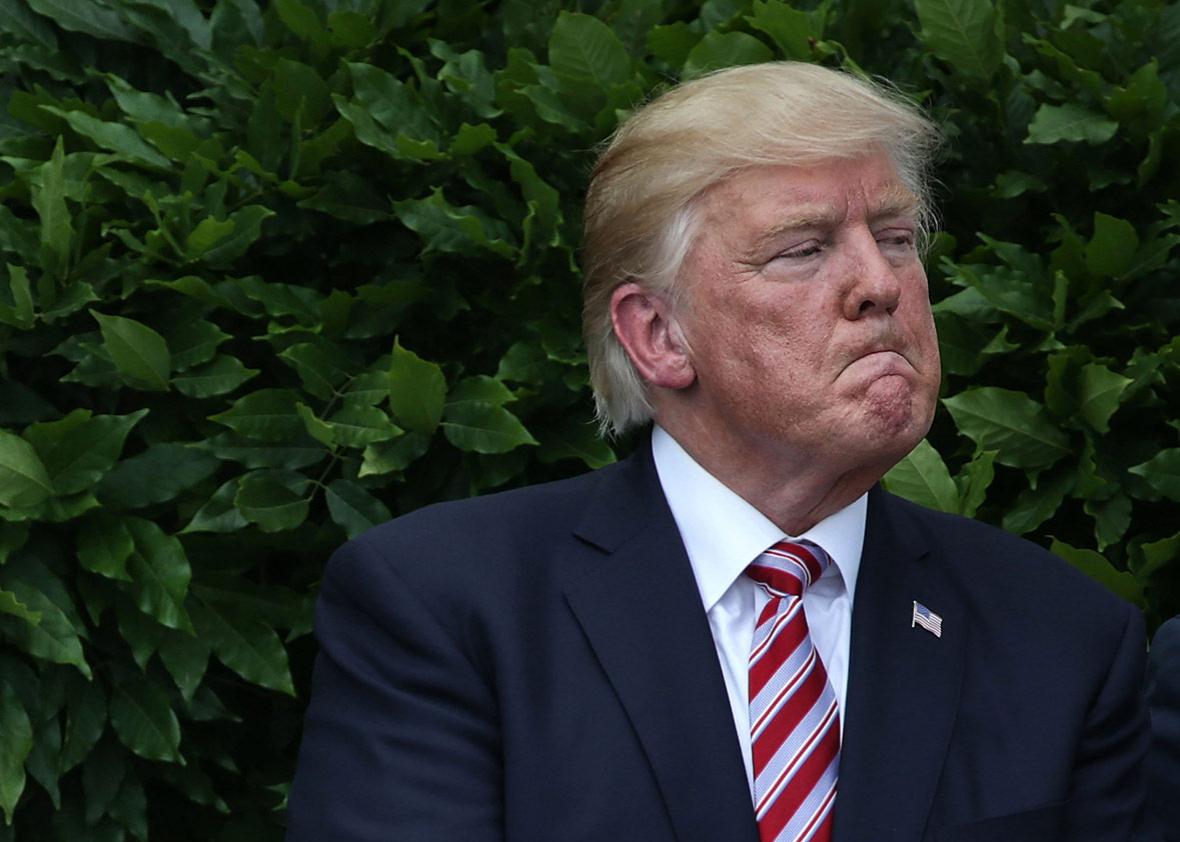What you don’t know can hurt you very badly, and there is a great deal that Republicans do not know about Donald Trump. From shady business dealings to questionable tax schemes to potential Russian collusion, the president is dogged by scandals whose depth and significance remain unclear. With few exceptions, Republicans are eager to protect Trump from serious inquiries, running interference where they can while pushing through their legislative agenda as quickly and secretively as possible. The GOP isn’t quite sure what it’s helping Trump to cover up—but as long as he promises to sign its bills, the party will condone his outrageous misdeeds.
This strategy now appears poised to backfire spectacularly. On Wednesday, both the New York Times and the Washington Post reported that special counsel Robert Mueller is investigating Trump’s inner circle for financial crimes. This aggressive shift toward Trump associates’ personal dealings is disastrous news for the president, his allies, and his enablers. At long last, federal investigators will probe Trump’s sprawling network for wrongdoing, picking up where reporters left off, only this time with subpoena power. And Trump can only stop them by firing Mueller—a blatant obstruction of justice that would likely be more damaging than any crime the president may have committed in the past.
In fairness, we still know little about what potential misconduct investigators are scrutinizing. But we know nothing they find is liable to be good news for Trump. The Post revealed that, in addition to exploring obstruction of justice, Mueller’s team is “looking for any evidence of possible financial crimes among Trump associates.” The Times elaborated that Mueller’s investigation “was looking at money laundering” among Trump’s inner circle in the form of a “financial payoff” from Russian officials routed “through offshore banking centers.”
These inquiries are bound to draw Mueller deeper into the details of the Trump family’s business empire. And even if they do not reveal outright collusion with Russia, they will allow Mueller to study complex transactions conducted behind closed doors with little oversight. Mueller can depose witnesses, subpoena records (including tax returns), and interview the president himself under oath. His skilled staff can pursue multiple leads and offer immunity to witnesses who are willing to talk. The special counsel can follow the breadcrumbs of criminality wherever they lead him, even if—especially if—they lead to the Oval Office.
And what, exactly, will Mueller find now that he has substantially broadened the scope of his investigation? It’s impossible to say, but easy to speculate. Reporters have already uncovered an astonishing amount of disturbing information about Trump. There’s the Azerbaijan hotel project propped up by graft and bribery with ties to Iran’s Revolutionary Guard. The charitable foundation accused of self-dealing and tax fraud. The questionable Deutsche Bank loans with ties to Moscow. The close association with allegedly criminal international companies. The journalists chasing these leads have hit snags, obstacles, and insurmountable walls, leading to stories that suggest the possibility of law-breaking but end with lingering uncertainty. Mueller need not put up with such stonewalling. He has the tools to dig much deeper.
Trump is now in a painful position: Either allow the investigation to continue and risk exposure of his possible criminality or fire Mueller and weather the resulting political catastrophe. Trump has already entertained the idea of terminating the special counsel. Although his advisers talked the president out of it for now, his surrogates have begun spreading anti-Mueller talking points—a coordinated effort to smear the special counsel that seems designed to preserve the possibility of his firing. Kellyanne Conway claimed Mueller’s team opposed Trump’s presidency, while Newt Gingrich insisted Mueller is “setting up a dragnet of obstruction” aimed at “undermining and crippling the Trump presidency.” Trump himself has tweeted that Mueller’s investigation is “the single greatest WITCH HUNT in American political history- led by some very bad and conflicted people!”
If Trump does fire Mueller, he will prove that he truly is terrified to have his past inspected by law enforcement—so terrified that he’d be willing to spark an enormous political firestorm. It’s not clear, however, that terminating Mueller would help Trump in any way. Trump thought he could stop the Russia investigation by firing FBI Director James Comey, going so far as to tell Russian officials that Comey’s termination would solve the problem. But it only saddled Trump with Mueller.
Sacking Mueller would end the special counsel investigation, at least temporarily. It would also constitute a clear case of obstruction of justice, one that would instigate an immediate, immense outcry. Washington would screech to a halt; any hope of passing health care or tax cuts would vanish. Republicans, no longer able to squeeze their agenda through to Trump’s desk, would see little reason to continue propping up the president. New investigations would follow, focusing squarely on an impeachable offense that Trump committed in broad daylight.
That is the dilemma that Trump faces: Answer for his old crimes, or commit a new one. Neither option will allow him to get to the business of governing; both pave the way to impeachment if the GOP grows frustrated by the lack of legislative progress. Mueller’s deepening dragnet has greatly increased the likelihood the president will face real consequences for his actions. We don’t yet know what those consequences look like. But they seem to be fast approaching.
